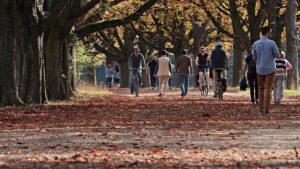When you were little, it’s likely your parents or guardians encouraged you to get outside and play. And I bet you didn’t stand around asking why. Just because you’re an adult now doesn’t change the fact that getting outside at least a little bit every day is healthy. Sure, you may not be playing cops and robbers with your buddies anymore, but there are plenty of adult-ish alternatives to get you off your couch and outside enjoying what nature has to offer.
The rewards of getting out of your house are practically limitless, especially if you’re a recovering addict. Addictions like to isolate us from the people we love. Once we are secluded and in dark, lonely places, those addictions can thrive. Dealing with the ups and downs of recovery is difficult in the best of situations, and spending the bulk of our time indoors and alone makes it much easier to give in to old, destructive habits.

(pixel2013 / pixabay)
So precisely how does getting outside help you maintain sobriety? Our substance abuse rehab experts narrowed the list down to five main reasons.
Table of Contents
1. Improved Focus and Concentration
People in the early phases of recovery treatment often experience something known as ‘brain fog.’ Symptoms include the inability to concentrate, confusion and disorientation, and racing thoughts. As the brain starts to heal from months or years of substance abuse, it must readjust to thinking and planning without using mind-altering substances.
Research shows that time spent in nature increased concentration levels in one study group. After working, study participants were divided into three groups – one group took a walk through the wilderness, the second group through a city, and the third just stayed put and relaxed. After returning, all participants completed a proofreading task. The nature walk group scored highest on the assignment. Other research has discovered that ADHD kids showed more significant concentration levels after a 20-minute walk in the park.
2. More Restful Sleep
Insomnia and trouble sleeping are common alcohol and drug withdrawal symptoms and tend to wreak havoc with recovery. Significantly, few people function well without quality, restful sleep. Spending time in natural light helps reset your body’s circadian rhythms by regulating its melatonin production.
Just seeing green is enough to make a difference in promoting better sleep. One study found that living near green landscapes is associated with higher levels of physical activity and that exercise, in turn, is a predictor of improved sleep. The study also discovered that men’s sleep quality is more positively affected by living near green space than women’s.
As an all-male drug rehab facility, we recognize that access to the outside is an essential aspect of addiction recovery. Despite its proximity to urban Salt Lake City, Renaissance Ranch is set on a relatively rural campus where recovering addicts have ample opportunity to enjoy the outdoors.
3. Enhanced Self-Esteem
While past research has clearly shown how nature walks and time spent outdoors can boost mood and self-esteem, does the same hold true for those battling addiction and other mental health issues? The answer is a clear yes!
Research has found that those suffering from depression, often a co-occurring condition with addiction, received a substantial boost in their mental health after interacting with nature. Nature walks also have been identified as creativity boosters, with research participants showing increased creativity and problem solving after spending time in green areas.
4. Reduced Stress/Lower Blood Pressure
Living your life will cause you stress; there are no ifs, ands, or buts about it. Add the pressure of maintaining sobriety, and you may feel that there’s no way you’ll be able to deal with all that cortisol coursing through your body. That said, you have a fantastic escape valve in the natural world. Whether you’re sitting on the beach, gazing out over the ocean, or taking a stroll through an inner-city park, taking time to unplug and breathe in the world around you has massive benefits.
Scientists have long reported that spending a few nights in the forest reduces your heart rate and the cortisol level in your body. In one particular Japanese study, results showed that one walk in the forest lowered a person’s stress hormone levels by more than 15 percent, their pulse rate by roughly 4 percent, and their blood pressure by just over 2 percent.
5. Less Loneliness and Boredom
Loneliness and boredom are prime relapse triggers, and the rise in addiction behaviors and mental health crises during the Covid-19 lockdowns provides ample evidence of that. Something changes when you get out of the house. When you spend time outside, you’re stimulating your body and brain in ways that are impossible to replicate inside – you’re smelling the flowers, you’re feeling the sun on your face, your toes are touching the grass. Your focus turns from yourself to a whole world that stretches beyond those four walls.
Being outside naturally puts you in the path of other people, as well. If you’re walking a well-traveled trail, doubtless, you’ll interact with some new or familiar faces. If you’re sitting on a park bench, others might find their way to that same bench and introduce themselves. Humans, even introverted ones, naturally crave activity and social connection. We tend to wither when we’re alone and idle. Nature is our antidote.
If you’re working hard to stay on your recovery path, consider taking that path outside – often. Daily ‘nature therapy’ is sometimes the only medicine you need.
